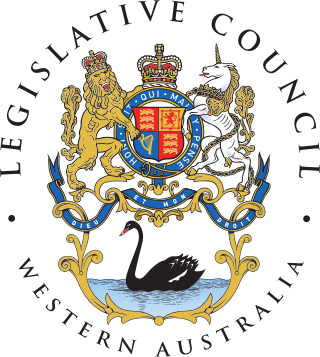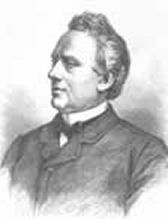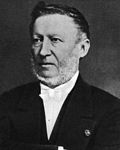
The House of Representatives is the lower house of the bicameral Parliament of Australia, the upper house being the Senate. Its composition and powers are set down in Chapter I of the Constitution of Australia.

The South Australian House of Assembly is one of the two chambers of the Parliament of South Australia, the other being the Legislative Council. It sits in Parliament House in the state capital, Adelaide.

An electoral district in Canada is a geographical constituency upon which Canada's representative democracy is based. It is officially known in Canadian French as a circonscription but frequently called a comté (county). In Canadian English it is also colloquially and more commonly known as a riding or constituency.

The 1909 Alberta general election was the second general election held in the Province of Alberta, Canada. It took place on March 22, 1909, to elect 41 members to the 2nd Alberta Legislature. The incumbent Liberal Party led by Premier Alexander C. Rutherford achieved a re-election victory, securing a majority government by winning 36 out of the 41 seats in the legislature with more than 59 percent of the popular vote. The Conservative Party led by Albert Robertson once again formed the official opposition, with only two members, and Robertson himself was defeated in his own seat in High River. The remaining three seats were divided among smaller parties and independent candidates.

The Western Australian Legislative Council is the upper house of the Parliament of Western Australia, a state of Australia. It is regarded as a house of review for legislation passed by the Legislative Assembly, the lower house. The two Houses of Parliament sit in Parliament House in the state capital, Perth.
Ashburton was a New Zealand electorate, first created in 1881 and centred on the South Island town of Ashburton.

General elections were held in Belgium on 23 May 1965. The result was a victory for the Christian Social Party, which won 77 of the 212 seats in the Chamber of Representatives and 44 of the 106 seats in the Senate. Voter turnout was 91.6%. Elections for the nine provincial councils were also held.
Taieri is a parliamentary electorate in the Otago region of New Zealand, initially from 1866 to 1911, and was later recreated during the 2019/20 electoral redistribution ahead of the 2020 election.
Full general elections were held in Belgium on 2 June, 1912.

General elections were held in Belgium on Tuesday 14 June 1892, the first full general elections since 1870 and the last before the introduction of universal male suffrage prior to the 1894 elections. The result was a victory for the Catholic Party, which won 92 of the 152 seats in the Chamber of Representatives and 46 of the 76 seats in the Senate. Only 2.2% of the country's population were eligible to vote.
General elections were held in Belgium on 29 August 1831. They were the first elections to the new bicameral parliament created by the constitution adopted in February 1831.

Partial general elections were held in Belgium on 8 June 1852. In the elections for the Chamber of Representatives the result was a victory for the Liberal Party, who won 57 of the 108 seats. Voter turnout was 69.2%, although only 42,053 people were eligible to vote.

General elections were held in Belgium on 10 December 1857, the first full general elections since 1848. The elections were called by royal order of 12 November 1857, dissolving the Chamber of Representatives that had convened in a new session only two days earlier.

General elections were held in Belgium on 11 August 1864, the first full general elections since 1857. The snap elections were called upon the loss of a parliamentary majority for the liberal government of Charles Rogier and a hung parliament, following the death of liberal representative Charles Cumont on 10 July 1864. In the last few parliamentary sessions preceding the elections, all Catholic members quit the Chamber, resulting in it not being quorate. The Chamber was disbanded by order of 16 July.

Partial general elections were held in Belgium on 12 June 1866. In the elections for the Chamber of Representatives the result was a victory for the Liberal Party, which won 70 of the 122 seats. Voter turnout was 70%, although only 51,465 people were eligible to vote.

Partial general elections were held in Belgium on 10 June 1890. In the elections for the Chamber of Representatives the result was a victory for the Catholic Party, which won 94 of the 138 seats.

Partial general elections were held in Belgium on 14 June 1859. The result was a victory for the Liberal Party, which won 69 of the 116 seats in the Chamber of Representatives and 31 of the 58 seats in the Senate. Voter turnout was 55.9%, although only 49,672 people were eligible to vote.

Early general elections were held in Belgium on 2 August 1870, the second that year after the partial elections in June had ended with both the Catholic Party and the Liberal Party holding 61 seats each. The result was a victory for the Catholic Party, which won 72 of the 124 seats in the Chamber of Representatives and 34 of the 62 seats in the Senate. Voter turnout was 68%, although only 107,099 people were eligible to vote.

Partial general elections were held in Belgium on 13 June 1882. The result was a victory for the Liberal Party, which won 79 of the 138 seats in the Chamber of Representatives and 37 of the 69 seats in the Senate. Voter turnout was 75.1%, although only 55,517 people were eligible to vote.

Legislative elections were held in Belgium in June and July 1884, for partial Chamber and full Senate elections respectively. Voter turnout was 79.1% in the Chamber of Representatives elections, although only 69,276 people were eligible to vote.
















